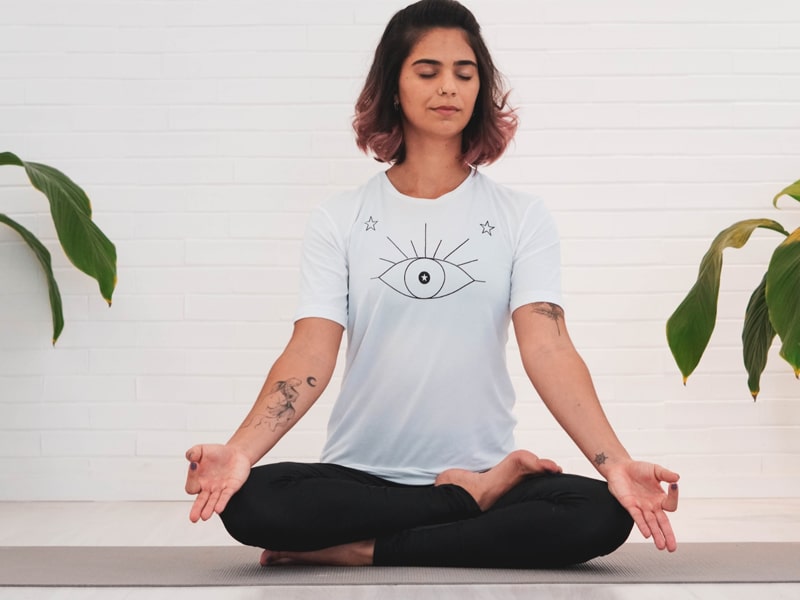Yoga is a practice that has been around for centuries, originating in ancient India as a way to achieve spiritual and physical enlightenment. Today, it has become a popular form of exercise and mindfulness, known for its ability to improve physical health, mental well-being, and overall quality of life. In this article, we’ll explore the many health benefits of yoga and how you can get started on your own yoga journey.
Introduction
Yoga is a holistic practice that incorporates physical postures, breathing techniques, and meditation to promote overall health and wellness. Its roots can be traced back to ancient India, where it was first developed as a spiritual practice to achieve enlightenment. Over time, yoga has evolved into a popular form of exercise and mindfulness, with many different styles and techniques.
One of the key benefits of yoga is its ability to promote physical health. Yoga postures, or asanas, can improve flexibility, strength, balance, and overall physical fitness. Additionally, yoga can help to improve mental health by reducing stress, anxiety, and depression. In this article, we’ll explore these benefits in more detail and provide tips for getting started with your own yoga practice.
Physical Health Benefits of Yoga
1. Improved Flexibility and Balance
One of the primary benefits of yoga is its ability to improve flexibility and balance. Yoga postures are designed to stretch and lengthen muscles, helping to increase range of motion and flexibility over time. Additionally, many yoga poses require balance and stability, which can help to improve overall balance and coordination.
2. Increased Muscle Strength and Tone
Yoga is also an effective way to build muscle strength and tone. Many yoga poses require you to support your own body weight, which can help to build strength in the arms, shoulders, legs, and core. Additionally, holding yoga poses for longer periods of time can help to build endurance and increase overall muscle tone.
3. Improved Respiration, Energy, and Vitality
Yoga incorporates specific breathing techniques, or pranayama, that can help to improve respiration, increase energy, and promote feelings of vitality. Deep breathing can also help to reduce stress and anxiety, which can have a positive impact on overall health and well-being.
4. Maintaining a Balanced Metabolism
Yoga can help to maintain a balanced metabolism, which can be particularly beneficial for individuals who are trying to manage their weight. Certain yoga poses can stimulate the thyroid gland, which is responsible for regulating metabolism. Additionally, yoga can help to reduce cortisol levels, which can have a positive impact on overall metabolism and weight management.
Also Read :- Raja Yoga – The Path to Self-Realization
5. Improved Cardio and Circulatory Health
Yoga can also have a positive impact on cardiovascular and circulatory health. Many yoga poses require deep breathing and increased blood flow, which can help to improve overall heart health. Additionally, yoga has been shown to help lower blood pressure and reduce the risk of heart disease.
6. Management of Chronic Conditions
Yoga can be particularly beneficial for individuals who suffer from chronic conditions such as arthritis, back pain, and other musculoskeletal issues. Yoga can help to improve flexibility and strength, which can reduce pain and discomfort associated with these conditions. Additionally, certain yoga poses can help to improve joint health and reduce inflammation, which can have a positive impact on overall health and well-being.
7. Boosted Immune System Functioning
Yoga can also help to boost immune system functioning. Certain yoga poses, such as inversions, can help to increase blood flow to the lymphatic system, which is responsible for removing toxins and waste products from the body. Additionally, yoga can help to reduce stress, which can have a positive impact on immune system functioning.
Also Read :- 9 Best Yoga Books in Hindi Language
Mental Health Benefits of Yoga
1. Stress Relief and Relaxation
Yoga is well-known for its ability to promote relaxation and reduce stress levels. The physical postures, breathing techniques, and meditation that are incorporated into yoga can help to lower cortisol levels, a stress hormone that can have negative effects on the body over time. In addition, yoga can help to promote relaxation and reduce feelings of anxiety and tension.
2. Improved Concentration and Focus
Yoga can also help to improve concentration and focus. Practicing yoga requires mental focus and attention to the present moment, which can help to improve overall cognitive function. Additionally, yoga can help to reduce distractions and increase mental clarity, which can have a positive impact on productivity and performance.
3. Increased Self-Awareness and Mindfulness
Yoga can help to increase self-awareness and mindfulness, which can have a positive impact on overall mental health and well-being. By focusing on the present moment and paying attention to your thoughts and feelings, you can develop a greater sense of self-awareness and mindfulness. This can help to reduce stress and improve overall emotional regulation.
4. Improved Mood and Emotional Regulation
Yoga has been shown to have a positive impact on mood and emotional regulation. The physical postures, breathing techniques, and meditation that are incorporated into yoga can help to reduce feelings of anxiety and depression, while promoting feelings of calm and relaxation. Additionally, yoga can help to improve overall emotional regulation and increase feelings of happiness and contentment.
5. Anxiety and Depression Management
Yoga can be an effective tool for managing symptoms of anxiety and depression. The deep breathing and meditation techniques that are incorporated into yoga can help to reduce feelings of anxiety and promote relaxation. Additionally, yoga can help to increase feelings of happiness and contentment, which can have a positive impact on overall mental health and well-being.
6. Addiction Recovery Support
Yoga can also be a useful tool for individuals who are recovering from addiction. Yoga can help to reduce stress and promote relaxation, which can be particularly beneficial for individuals who are recovering from substance abuse. Additionally, yoga can help to increase feelings of self-awareness and mindfulness, which can be helpful in promoting long-term recovery.
Also Read :- 6 Best Branded Aerial Yoga Hammock Swing in India
The Spiritual Benefits of Yoga
1. Connection to a Higher Power or Purpose
Yoga can help to promote a connection to a higher power or purpose. By focusing on the present moment and cultivating a sense of inner peace and calm, you can develop a deeper connection to yourself and the world around you. This can help to promote a greater sense of purpose and meaning in life.
2. Increased Sense of Inner Peace and Calm
Yoga can also help to promote a sense of inner peace and calm. The physical postures, breathing techniques, and meditation that are incorporated into yoga can help to reduce stress and promote relaxation, which can help to promote feelings of peace and calmness.
Also Watch :- Watch Beautiful Yoga Images HD Here
3. Greater Clarity and Intuition
Yoga can help to promote greater clarity and intuition. By focusing on the present moment and paying attention to your thoughts and feelings, you can develop a greater sense of clarity and intuition. This can help to improve decision-making and promote a greater sense of purpose and direction in life.
4. Enhancing Gratitude and Positive Thinking
Yoga can also help to enhance gratitude and positive thinking. By focusing on the present moment and cultivating a sense of inner peace and calm, you can develop a greater sense of gratitude and appreciation for the world around you. This can help to promote positive thinking and increase overall happiness and well-being.
Getting Started with Yoga
If you’re interested in getting started with yoga, there are a few things to keep in mind. First, it’s important to find a yoga class or teacher that is a good fit for you. There are many different types of yoga, so it’s important to do some research and try out different classes to find the one that resonates with you the most.
It’s also important to start slowly and not push yourself too hard. Yoga is a practice that requires patience and consistency, so it’s important to listen to your body and not push yourself beyond your limits. You can always modify poses or take a break if you need to.
Additionally, it’s important to have the right gear. While you don’t need expensive equipment to practice yoga, it’s important to wear comfortable, breathable clothing and have a yoga mat to provide cushioning and grip.
Finally, it’s important to make time for yoga in your schedule. Even just a few minutes a day can have a positive impact on your mental and physical health. You can start with a simple yoga routine in the morning or before bed and gradually increase the duration and intensity as you become more comfortable.
Conclusion
In conclusion, yoga is a powerful practice that offers a wide range of physical, mental, and spiritual benefits. Whether you’re looking to improve your flexibility and strength, reduce stress and anxiety, or deepen your connection to a higher power, yoga can be a valuable tool for enhancing your overall health and well-being. By finding the right yoga practice for you and committing to a regular practice, you can experience the transformative power of yoga in your own life.



